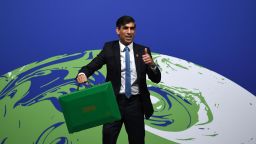If you drive an older, polluting car anywhere in London, starting Tuesday you’ll have to pay a princely charge of £12.50 ($15.70) per day.
In 2019, the British capital became the first city in the world to introduce a round-the-clock Ultra Low Emission Zone, inside which cars and other vehicles have to meet tough emissions standards or face a toll.
That followed the implementation of road pricing in 2003 aimed at reducing congestion in central London. The ULEZ was expanded in 2021 and on Tuesday will be widened again, this time to cover the city’s outer boroughs and suburbs. The charge applies 24/7 to gasoline cars generally first registered before 2006 and diesel cars registered before October 2015.
“There is still far too much toxic air pollution permanently damaging the health of young Londoners and leading to thousands of early deaths every year,” London Mayor Sadiq Khan said in November when he announced the latest expansion.
“Expanding the ULEZ London-wide will mean 5 million more people will be able to breathe cleaner air and live healthier lives.”
Road pricing to deal with congestion has also been in place in Stockholm since 2007, and in Singapore since as far back as 1975.
New York City is now finally catching up. Gov. Kathy Hochul said in June that the city had been cleared to start charging drivers entering downtown Manhattan. This means New York City could become the first US city to introduce a congestion charge as early as next spring, after more than half a century of trying.
Proposals range from charging vehicles $9 to $23 during peak hours.
The New York toll is designed to lower the number of vehicles entering the congestion zone by at least 10% every day. Slashing congestion would also reduce planet-heating carbon emissions and other pollution.
But the plan is already facing a legal challenge. In July, New Jersey filed a lawsuit against the US Department of Transportation, which gave the final approval for New York City’s congestion pricing.
The expansion of the ULEZ in London has also been controversial. It spurred — and survived — a legal challenge brought by local authorities in four outer London boroughs and a county bordering the city.
Opposition to the expansion dominated an election in July for a new member of parliament for Uxbridge, a region on the western fringe of London. Khan’s Labour Party narrowly lost the contest for the seat previously held by the Conservative former Prime Minister Boris Johnson.
In early August, Khan expanded a scrappage program to offer grants of up to £2,000 ($2,517) to every Londoner with a car or motorcycle that doesn’t comply with ULEZ standards.









